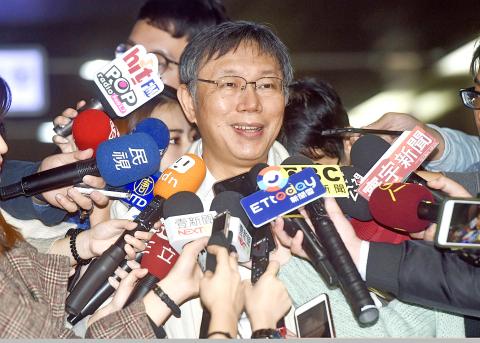Few Taiwanese would fully accept the so-called “1992 consensus” as Chinese President Xi Jinping (習近平) defined it last week, Taipei Mayor Ko Wen-je (柯文哲) said yesterday.
Xi in a speech on Wednesday last week called for unification under the “one country, two systems” formula and defined the “1992 consensus” as being based on the “one China” principle.
Xi’s definition of the “1992 consensus” contrasted with that provided over the years by the Chinese Nationalist Party (KMT), which has maintained that it allows room for Taiwan to interpret “China” as being the Republic of China (ROC).

Photo: Chien Jung-fong, Taipei Times
Asked about the different definitions of the “1992 consensus,” Ko said: “Then it means that there is no consensus.”
“The mainland recently announced its version of what the ‘1992 consensus’ means, but after Taiwanese learned about it, I think very few people would be willing to fully accept it,” he said.
Asked whether he supports the “four musts” put forward by Tsai Ing-wen (蔡英文) as conditions for cross-strait ties, Ko said his support is not important.
The government should try to act on its proposals and let the public decide whether it supports them, Ko said.
Tsai in a speech said that China must face the reality of the existence of the ROC; must respect the commitment of 23 million Taiwanese to freedom and democracy; and must handle cross-strait differences peacefully, on a basis of equality; and governments or government-authorized agencies must carry out cross-strait negotiations.

Three Taiwanese airlines have prohibited passengers from packing Bluetooth earbuds and their charger cases in checked luggage. EVA Air and Uni Air said that Bluetooth earbuds and charger cases are categorized as portable electronic devices, which should be switched off if they are placed in checked luggage based on international aviation safety regulations. They must not be in standby or sleep mode. However, as charging would continue when earbuds are placed in the charger cases, which would contravene international aviation regulations, their cases must be carried as hand luggage, they said. Tigerair Taiwan said that earbud charger cases are equipped

UNILATERAL MOVES: Officials have raised concerns that Beijing could try to exert economic control over Kinmen in a key development plan next year The Civil Aviation Administration (CAA) yesterday said that China has so far failed to provide any information about a new airport expected to open next year that is less than 10km from a Taiwanese airport, raising flight safety concerns. Xiamen Xiangan International Airport is only about 3km at its closest point from the islands in Kinmen County — the scene of on-off fighting during the Cold War — and construction work can be seen and heard clearly from the Taiwan side. In a written statement sent to Reuters, the CAA said that airports close to each other need detailed advanced

Tropical Storm Fung-Wong would likely strengthen into a typhoon later today as it continues moving westward across the Pacific before heading in Taiwan’s direction next week, the Central Weather Administration (CWA) said. As of 8am, Fung-Wong was about 2,190km east-southeast of Cape Oluanpi (鵝鑾鼻), Taiwan’s southernmost point, moving westward at 25kph and possibly accelerating to 31kph, CWA data showed. The tropical storm is currently over waters east of the Philippines and still far from Taiwan, CWA forecaster Tseng Chao-cheng (曾昭誠) said, adding that it could likely strengthen into a typhoon later in the day. It is forecast to reach the South China Sea

WEATHER Typhoon forming: CWA A tropical depression is expected to form into a typhoon as early as today, the Central Weather Administration (CWA) said yesterday, adding that the storm’s path remains uncertain. Before the weekend, it would move toward the Philippines, the agency said. Some time around Monday next week, it might reach a turning point, either veering north toward waters east of Taiwan or continuing westward across the Philippines, the CWA said. Meanwhile, the eye of Typhoon Kalmaegi was 1,310km south-southeast of Oluanpi (鵝鑾鼻), Taiwan’s southernmost point, as of 2am yesterday, it said. The storm is forecast to move through central